Three New Casualties in Afghanistan, Including First Female Casualty Since Vietnam War
Prime Minister, Minster of Defence and Defence Chief of Staff Press Conference
20 Aug, 2012
By Mark P. Williams
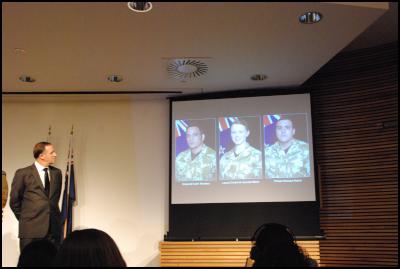
Click for big version.
Following the deaths of three more NZDF personnel in Afghanistan the Prime Minister this morning gave a joint press conference with Defence Minister Jonathan Coleman and Chief of Defence Force Lieutenant General Rhys Jones. The Defence Minister named the three servicemen and women as Corporal Luke Tamatea, 31, Lance Corporal Jacinda Baker, 26, and Private Richard Harris, 21. They were killed when the Humvee they were travelling in was hit by an improvised explosive device.
These deaths bring the overall number of New Zealanders killed while serving in Afghanistan to 10 and mark the first female casualty since the Vietnam war.
The Prime Minister said that the timing of the proposed withdrawals of New Zealand troops from Bamyan had not been affected by the deaths of the soldiers. The Defence Minister added that these sad events will not affect the NZDF's plan for its path ahead.
Lt. Gen. Rhys Jones gave details of the careers of the three soldiers. Corporal Tamatea had previously served in Timor Leste in 2001, to the Solomon Islands in 2003, and to Sumatra to help with the Tsunami in 2005, as well as previously serving in Afghanistan in 2007. Lance Corporal Baker had been previously deployed to the Solomon Islands in 2010 and received a commendation for her professionalism in 2011. Private Harris had previously deployed to Timor between 2009 and 2010. He then gave an outline of the order of events surrounding the incident.
Questions
The Prime Minister, Defence Minister and Defence Chief were asked questions regarding the specifics of the incident which resulted in the deaths of the three service personnel, the long term goals and benefits of New Zealand's role in Afghanistan, and the withdrawal date of 2013.
Lt Gen. Jones was asked what was being done to improve and "beef up" the defences of NZ troops. He responded that a wide variety of approaches were being employed.
He was asked whether NZDF would continue to use Humvees in that area; he confirmed that the NZDF would do so because the Humvees had superior mobility to the heavier armoured vehicles deployed elsewhere.
Lt Gen. Jones was asked whether the NZDF had found the bomb-maker involved in the incident two weeks ago which resulted in the deaths of Lance Corporals Rory Malone and Pralli Durrer and whether this recent incident would mean they would step up efforts to apprehend them. He responded that the search for the bomb-maker remained a matter for the Afghan police force.
The PM was asked what was served by NZDF troops remaining in Afghanistan even until 2013. He responded that there was no doubt that the New Zealand troops' involvement in the region had benefitted the lives of many ordinary Afghans. He added that in terms of withdrawing NZDF troops any earlier than 2013 it would neither be practical to leave so early, nor would it be the right thing to do.
The PM was asked whether the NZDF had played more of a combat role than anticipated. He responded that their role had been a primarily providing assistance for humanitarian and development and reconstruction efforts.
The PM said that dispatching the SAS back to Afghanistan in a combat role was not on the cards but that a small number might take part in a support and planning capacity.
Lt Gen. Jones was asked whether he thought the troops would have survived had they been travelling in an LAV; he responded that the explosion was so large that they would not.
Lt Gen. Jones emphasised that this was not a "one-off event" but that this was still a "war zone" and it was representative of an on-going level of threat based on the nature of the organised group that they were fighting in the area.
Lt Gen. Jones was asked whether New Zealand was unique in having women on the front line; he responded that no, many European nations had women on the front line, primarily in communications, logistical and medical support roles.
Lt Gen. Jones was asked if New Zealand had achieved what it set out to do in Afghanistan and whether it was a safer place; he responded that yes it was, adding "it's a safer place for ten year old girls to go to school" and that there was less religious repression as a result of New Zealand's activities in the region.
He was asked about the importance of using women in front line roles in Afghanistan. He said that they were very significant in enabling New Zealand to encourage and develop attitudes of equality as well as enabling the NZDF to communicate more fully with locals by having someone on hand who would be able under local law to speak to women and children.
Lt Gen. was asked how safe he though the local Afghans would be once the NZDF left. He responded that the country "may never be a Western style democracy" but it would certainly be better than if they had not been there.
Click a link to play audio (or right-click to
download) in either
MP3 format or in OGG format.
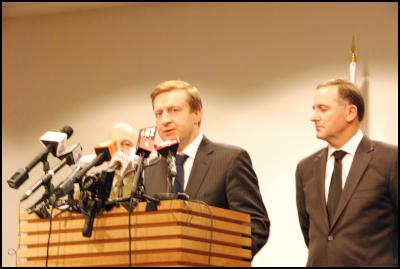
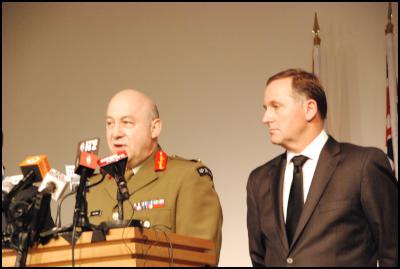

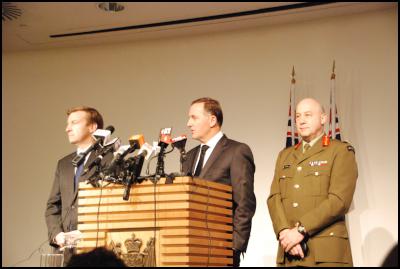
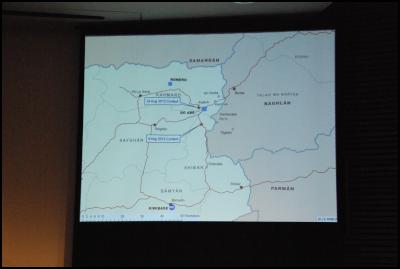
Click for big version.
ENDS



 Eugene Doyle: Before It’s Too Late - Reimagine New Zealand’s Military Future
Eugene Doyle: Before It’s Too Late - Reimagine New Zealand’s Military Future  Binoy Kampmark: Gender Stunts In Space - Blue Origin’s Female Celebrity Envoys
Binoy Kampmark: Gender Stunts In Space - Blue Origin’s Female Celebrity Envoys Richard S. Ehrlich: A Deadly Earthquake & Chinese Construction
Richard S. Ehrlich: A Deadly Earthquake & Chinese Construction Ian Powell: It Does Matter To Patients Whether They Are Operated In A Public Or Private Hospital
Ian Powell: It Does Matter To Patients Whether They Are Operated In A Public Or Private Hospital Gordon Campbell: On Marketing The Military Threat Posed By China
Gordon Campbell: On Marketing The Military Threat Posed By China Binoy Kampmark: Olfactive Implications - Perfume, Power And Emmanuel Macron
Binoy Kampmark: Olfactive Implications - Perfume, Power And Emmanuel Macron